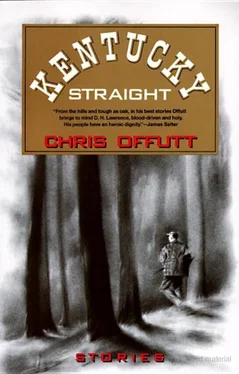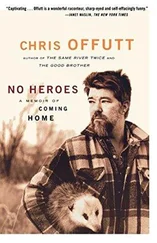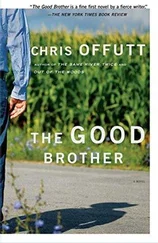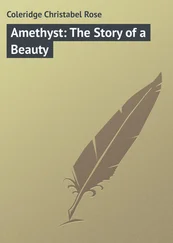“I don’t want a haircut, ma’am. I might could use one but that ain’t what I come to town for.”
“It ain’t,” she said like she was mocking me. She talked fast and didn’t always say her words right. I wondered what brought her to the hills. Things must be getting pretty bad if city people were coming here for work.
“I’ll take that GED,” I said.
“Who sent you?”
“Nobody.”
She stared at me a long time. Her hand moved like she was waving away flies and when the nail polish was dry, she opened a drawer and gave me a study book. It was magazine size with a black plastic binder.
“Come back when you’re ready,” she said. “I’m here to help you people.”
I was five hours getting home and the heat didn’t bother me a bit. By the time I got to the house, somebody had seen me in town and told a neighbor, who told Mom at the prayer meeting. That’s the way it is around here. A man can sneeze and it’ll beat him back to the porch.
“They say you’re fixing to get learned up on us,” she said. “You might read the Bible while you’re at it.”
“I done did. Twice.”
“I ain’t raised no heathen then.”
After supper I hit those practice tests. My best was reading and worst was math. A man can take a mess of figures and make it equal out to something different. Maybe some people like math for that, but a pile of stove wood doesn’t equal a tree. It made me wonder where the sawdust went to in a math problem. After all that ciphering, there wasn’t anything to show for the work, nothing to clean up, nothing to look at. A string of numbers was like an owl pellet lying in a game path. You knew a bird had flew over, but not the direction.
Warren pulled his four-wheel-drive pickup into the yard, honking the horn. He used to work in town until they built a car plant in Lexington. Now he drives three hours a day to work and back. He’s got a video dish, a microwave, and a VCR.
His boots hit the porch and the front door slammed. He walked in our old room. “What do you know, Junior? All on your ownself and afraid to tell it.”
I shook my head. After Dad died, Warren went all out to make people like him. I went the other way.
“Hear you’re eat up with the smart bug,” he said. “And taking that school test in town.”
“Thinking on it.”
“You ought to let up on that and try working. Then you can wear alligator-hide boots like these.”
He pulled a pants leg up.
“Where’d you get them from?” I said.
“Down to Lex. They got a mall big as two pastures laid end to end. I bought these boots right out of the window. Paid the man cash, too.”
“He saw you coming, Warren. They ain’t made no alligator nothing in nigh ten years. Government’s got them took care of.”
“What makes you know so much?”
“Read it in a magazine.”
Warren frowned. He doesn’t put much store in anything but TV. Commercials are real people to him. I knew he was getting mad by a neck vein that popped up big as a night crawler.
“I ought to kick your butt with these boots,” he said.
“That won’t make them gator.”
“It won’t take the new out either.” He scuffed my workshoes that were ordered from the Sears and Roebuck catalog. “You’re still wearing them goddam Wishbook clod-hoppers.”
“Warren!” Mom screeched from the kitchen.
She doesn’t mind cussing too awful much but taking the Lord’s name in vain is one thing she won’t stand for. Dad used to do it just to spite her.
“You know what GED stands for?” Warren said. “Get Even Dumber.”
He stomped outside, started his truck, and rammed it through the gears. Road dust rose thick as smoke behind him. I watched the moon haul itself above Redbird Ridge. Night crawled up the hollow. I went outside and sat on Dad’s old map-stump. A long time ago I was scared of the dark until Dad told me it was the same as day, only the air was a different color.
In a week I’d taken every practice test twice and was ready for the real one. Everybody on the hill knew what I was doing. The preacher guaranteed Mom a sweet place in heaven for all her burdens on earth. He said I was too hardheaded for my own good.
I got to thinking about that in the woods and decided maybe it wasn’t a bad thing to be. I’m not one to pick wildflowers and bring them inside where they’ll die quicker. And I’ll not cut down a summer shade tree to burn for winter firewood. Taking the GED was the first time I’d ever been stubborn over the doing of something, instead of the not doing. Right there’s where Dad and me were different. He was hardheaded over things he never had a say in.
In the morning I left the hill and walked halfway to town before getting a ride that dropped me off at the test place. The lady was surprised to see me. She wrote my name on a form, and asked for fifteen dollars to take the test. I didn’t say anything.
“Do you have the fee?” she asked.
“No.”
“Do you have a job?”
“No.”
“Do you live with family?”
“Mom.”
“Does she have a job?”
“No.”
“Do you receive welfare assistance?”
“No, ma’am.”
“Then how do you and your mother get along?”
“We don’t talk much.”
She tightened her mouth and shook her head. Her voice came slow and loud, like I was deaf.
“What do you and your mother do for money?”
“Never had much need for it.”
“What about food?”
“We grow it.”
The lady set her pencil down and leaned away from the desk. On the wall behind her hung a picture of the governor wearing a tie. I looked through the window at the hardware store across the street. Dad died owing it half on a new chain saw. We got a bill after the funeral and Mom sold a quilt her great-aunt made, to pay the debt.
I was thinking hard and not getting far. There wasn’t anything I had to sell. Warren would give me the money but I could never ask him for it. I turned to leave.
“Junior,” said the lady. “You can take the test anyway.”
“I don’t need the help.”
“It’s free when you’re living in poverty.”
“I’ll owe you,” I said. “Pay you before the first snow.”
She led me through a door to a small room with no windows. I squeezed into a school desk and she gave me four yellow pencils and the test. When I finished, she said to come back in a month and see if I passed. She told me in a soft voice that I could take the test as many times as necessary. I nodded and headed out of town toward home. I couldn’t think or feel. I was doing good to walk.
Every night Mom claimed a worry that I was getting above my raisings. Warren wouldn’t talk to me at all. I wandered the hills, thinking of what I knew about the woods. I can name a bird by its nest and a tree by the bark. A cucumber smell means a copperhead’s close. The sweetest blackberries are low to the ground and locust makes the best fence post. It struck me funny that I had to take a test to learn I was living in poverty. I’d say the knowing of it is what drove Dad off his feed for good. When he died, Mom burned his maps but I saved the one of Kentucky. Where we live wasn’t on it.
I stayed in the woods three weeks straight. When I finally went to the post office, the mail hadn’t run yet. It was the first of the month and a lot of people were waiting on government checks. The oldest sat inside, out of the sun, and the rest of us stood in willow shade by the creek. A Monroe boy jabbed his brother and pointed at me.
“If it ain’t the doctor,” he said, “taking a break off his books.”
“Hey, Doctor, you aiming to get smart and rich?”
“Yeah,” said his brother. “He’s going to start a whorehouse and run it by hand.”
Читать дальше












